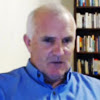
Bede Clifford
This is the first of an ongoing series written by Bede Clifford. Bede is a student of Swamini Atmaprakasananda. He comes to Vedanta from a background of Theology, Philosophy, Sociology & Psychology.
Click here to view Bede Clifford’s YouTube channel
Being a Student of Vedanta Part 1
Everything that happens in our lives has a meaning to us. When we are loved, that means something to us. When we are hated, this hatred has a different meaning to us than when we are loved. So everything that we see has a meaning for us. Now here is the thing. What determines how we understand ourselves, other people and our world? Obviously everything that happens to us means something to us. We go “I like that”. Or “I don’t like that” or “I am indifferent to that”. Before we make conclusions like these we have ascertained what the event or person means to us. When someone says that rotten person did a horrible thing. That person is communicating the meaning that that person has for them. But again here is the interesting question. What determines the meaning? If you asked the person who thinks that the person is rotten why they think that way they will tell you that it is because of what they have done. This sounds reasonable however this is not the determining factor that determines the meaning you have about the things that happen to you. Another factor remains hidden in the background.
Let us say that I told you about a guy who ripped open another guys belly with a knife. Now that means something to you straight away. You probably won’t like the guy because you don’t like violent actions like that. But what if you found out that the guy was a young surgeon trying to save another’s life under enemy fire. Now the same event has an entirely different meaning for you. You see it differently. Now the point we need to take from this is this. THE CONTEXT FROM WHICH WE LOOK AT PEOPLE AND EVENTS DETERMINES THE MEANING THAT PEOPLE AND ENVENTS HAVE FOR US.
The oxford dictionary defines context in this way.
Context: the circumstances that form the setting for an event, statement, or idea, and in terms of which it can be fully understood
this is a good definition but we are going to modify it slightly for our Vedantic our purposes here
Context: the standpoint that forms the setting for an event, statement, or idea, in terms of which the event, statement, or idea is understood.
When you found out that the setting was a battlefield and the guy was a surgeon there was a sudden context shift which transformed your cognition of the event. Within this context and only within this context could you understand this event in the right way? This shifting of our way of seeing or cognising Swami Dayananda gives the term “cognitive shift”.
Now you may be thinking Bede has gone of on a tangent. This is supposed to be about Vedanta. In fact it is about the most important thing for us as students of Vedanta. The most important thing for us as students of Vedanta is to study Vedanta from the right context. If we fail to do this we will not understand the teaching in the right way. We will understand it in our way.
My teacher early on in my Vedantic studies made it very clear that there was only one context and one context alone that Vedanta can be understood. If we don’t study from WITHIN this context Vedanta will have a meaning for us but not the one intended by the scriptures. We will be wasting our time. Everything we hear will be taken in the wrong way. This was very important thing for me to understand and I wish to share this with my fellow students. I will do it in parts so I can go step by step. I just wanted to set the context first so you would understand me in the right way.
